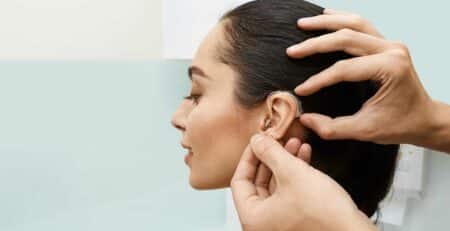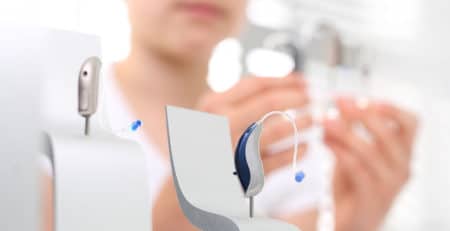Is Hearing Loss in One Ear Possible?
For most people who have hearing loss, both of their ears will be affected. This type of hearing loss is called binaural hearing loss. However, it is possible to lose hearing in only one ear, which can happen at birth or later. Hearing loss in only one ear is known as unilateral loss. If the loss in the affected ear is profound, it is called single-sided deafness.
The loss of hearing can occur suddenly or gradually. When the loss is sudden, people should treat it as an emergency and seek prompt medical treatment.
How does unilateral hearing loss affect your hearing?
Your brain relies on both ears to identify the location from where a sound is coming and to improve the range and quality of your hearing. Losing your hearing in one year can have several impacts, depending on the severity of your loss.
If you lose hearing in one ear, your brain will not always be able to identify the location from where a sound is coming. People who have hearing in both ears identify the location of a sound by the ear that hears the sound first. This is known as directional hearing. If you can only hear from a single ear, you might have trouble identifying the origin of a sound.
People with unilateral hearing loss also have trouble hearing others when they are in noisy areas. If you do not have the help of a second ear, your brain will have trouble filtering out extra noises and selectively listening to the sounds that are important. This might make it difficult for you to focus on something one person is saying to you.
You might also have a difficult time detecting the loudness of a sound since your brain hears differences in volume when sounds are perceived through both of your ears than if they are only perceived through one of your ears.
Because of a combination of these issues, unilateral hearing loss can make it difficult for you to multitask and cause you to experience listening fatigue. The noisier your environment is, it will take a longer time for you to focus on the tasks you are trying to accomplish. If you are also trying to do something while also attempting to listen to someone speaking to you, you might not hear a significant portion of what he or she is saying to you.
The head shadow effect
Single-sided deafness can also cause something called the head shadow effect. Because of the way in which sound waves move through the air, sounds at higher frequencies will not bend around your head to your good ear. This means you might never hear a high-frequency sound that comes from the side of your head with your deaf ear. Instead, your head will block those sounds and cause speech to sound muffled.
Causes of unilateral hearing loss
Some of the causes of unilateral hearing loss include the following:
- Infections
- Physical trauma to the ear or head
- Meniere’s disease
- Genetic disorders
- Circulatory disorders
- Acoustic neuroma
Treating unilateral hearing loss
If your loss is mild to moderate, a hearing aid can help to amplify sounds. If your hearing loss in one ear is profound, your deafness in that ear will likely be permanent. However, treatment might be available by wearing devices on your functional ear. An audiologist can perform tests and might recommend a few different types of systems.
A contralateral routing of the sound system (CROS) is meant for people who have normal hearing in one ear but a near-total loss in the other. This system detects sound signals in the deaf ear and then sends them to the functional ear. If you use this system, you will wear devices on both of your ears, including a transmitter on your deaf ear and a microphone so that your functional ear can detect the sound.
A BiCROS system is designed for people who have moderate to severe hearing loss in their functional ear and near to total loss in the other ear. The device on the functional ear will receive both the amplified sound from the transmitter and will also have a regular hearing aid to amplify the other sounds.
Bone-anchored hearing systems are surgically implanted and are used for people who do not find the other types helpful. They send vibrations of sound directly to your inner ear through the bone of the skull and can help people with ear canal and middle ear problems.
Cochlear implants directly stimulate your auditory nerve. However, they are normally not used for single-sided deafness. In July 2019, the Food and Drug Administration did approve one cochlear implant for use with single-sided deafness.
Talk to Audiology by Accent
If you have hearing loss in one ear, you should talk to the professionals at Audiology by Accent in Gainesville, Florida about the potential options that might help. Call us today to schedule an appointment at (352) 271-5373.
Read more about hearing loss in one ear:
https://www.webmd.com/connect-to-care/hearing-loss/possible-causes-of-hearing-loss-in-one-ear











